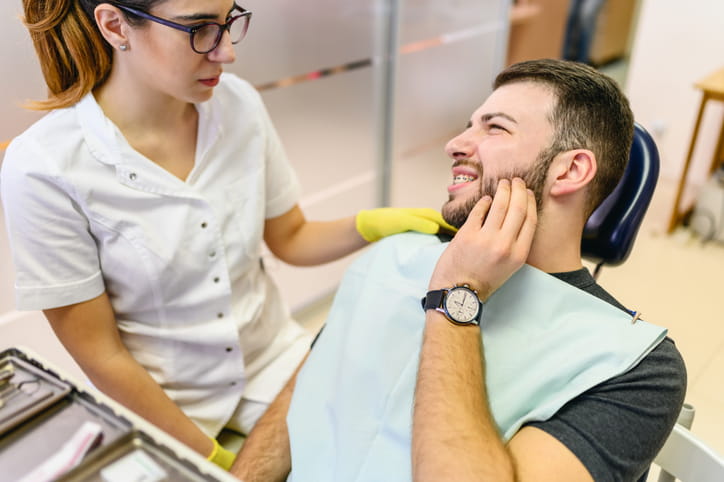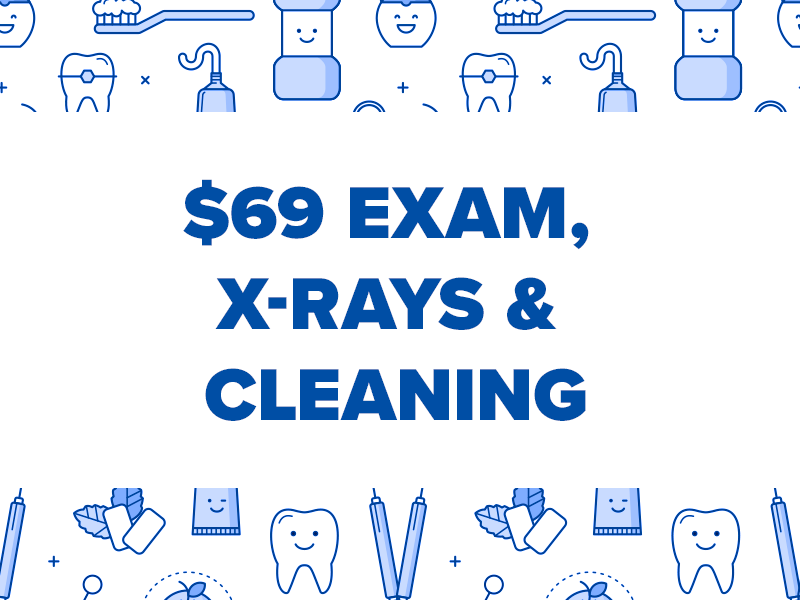Dental Emergencies Frequently Asked Questions
What Should You Do If You Have A Dental Emergency?
There are some steps you should take that apply to specific dental emergencies. For example, if you have a knocked-out tooth, your dentist may be able to replant the tooth. You can either replace the tooth in its socket and hold it there until you can see our emergency dentist or transport your tooth in a cup of cow’s milk. If cow’s milk isn’t available, you can submerge your tooth in a cup of your saliva.
However, suppose you have a broken dental appliance. In that case, you should promptly collect all the pieces and show them to your emergency dentist. You may also need to take steps to manage the bleeding if there’s damage to your gums or teeth.
If you’re unaware of the cause of your emergency or what to do to deal with your symptoms, you can take the following steps:
- For dental emergencies, call Absolute Dental’s Las Vegas hotline (702) 744-8009)
- Describe your symptoms or condition and make arrangements for emergency dental services from one of our board-certified dentists
- Follow any instructions given before coming to our office
Our emergency dentist will tell you if you should rinse your mouth, apply ice packs, or take any other steps before coming to our office.
What Is Considered A Dental Emergency?
You need emergency dental care if you have a fractured or dislodged tooth or any of the other issues listed on our list of dental emergencies. However, you may also need emergency dental services if you have symptoms such as pain or bleeding gums.
Determine if any of the following apply to your situation:
- You have an identifiable emergency on our dental emergency list
- You have a swollen mouth or jaw
- You have worsening pain in your teeth, jaw, or gums
- Your gums or teeth are bleeding
- You’re suffering from severe pain
These symptoms indicate you need emergency dental care. It’s best to contact our office to speak to a dentist immediately rather than delay treatment.
What Is The Most Common Dental Emergency?
Toothaches are the most common dental emergency. One of the reasons you should seek emergency dental care near you is that several root causes could be responsible for your toothache. Your dentist will diagnose the cause and provide appropriate treatment to alleviate your symptoms.
Some causes of this common emergency include:
- Inflammation of the dental pulp
- Abscess
- Cellulitis
- Inflamed gums
Damaged, loose, and dislodged teeth are also common reasons people need emergency dental care. Reasons for damaged, loose, or dislodged teeth include the following:
- Blow to the mouth
- Car accidents
- Falls
- Sports injuries
What Is The Best Painkiller For A Severe Toothache?
You may be able to alleviate your pain with over-the-counter painkillers, such as acetaminophen or ibuprofen. You can use the oil of cloves for a home remedy that may offer some relief. Purchase oil of cloves from a drugstore, soak a cotton ball in the oil, and bite down on the cotton ball.
You should floss your teeth, particularly those close to the source of the pain. If something is stuck between your teeth, flossing could remove the source of your discomfort and provide relief.
Other options for alleviating tooth pain include rinsing your mouth with warm salt water. You can also manage pain by applying dental anesthetic gel.
You can reduce your pain by avoiding hot and cold foods and using toothpaste designed to reduce tooth sensitivity. Elevating your head while sleeping may also help. However, these are solutions that may offer little immediate relief.
How Can I Sleep With A Toothache?
If you’re unable to seek emergency dental care promptly, you may struggle to sleep if you’re suffering from severe pain. The following options can help you manage your pain so that you can sleep:
- Elevate your head: Elevating your head prevents blood from rushing to the tooth, which may intensify the pain.
- Rinse your mouth: Rinse with warm salt water.
- Take painkillers: Acetaminophen and ibuprofen are over-the-counter painkillers that can be obtained without a prescription. These can help to manage the pain.
- Use ice packs: Applying ice packs can reduce your pain.




















